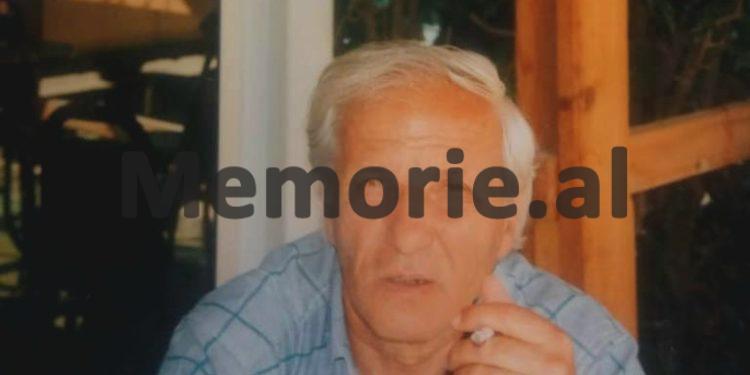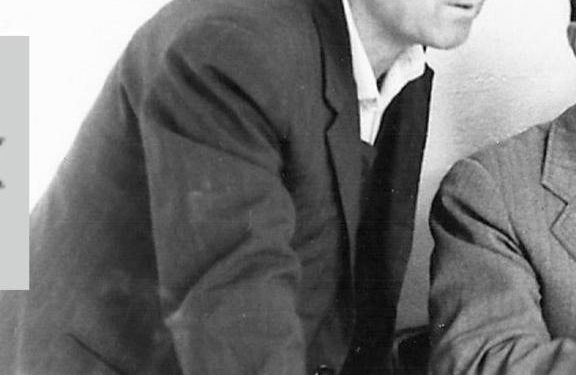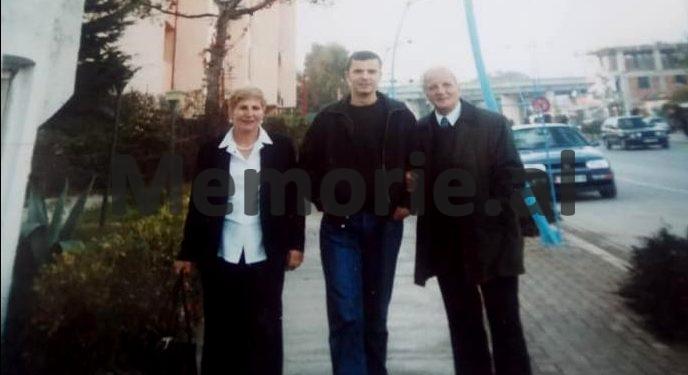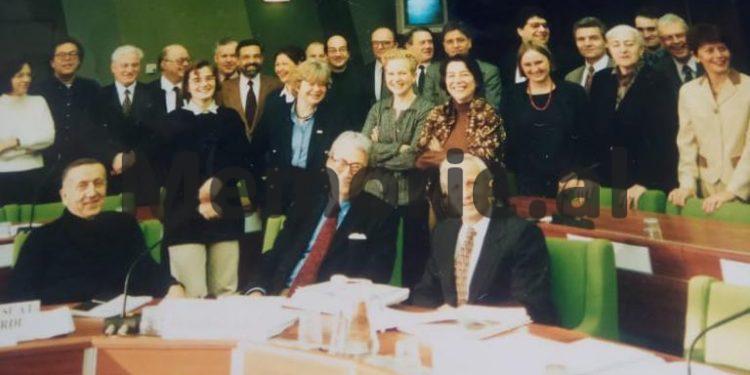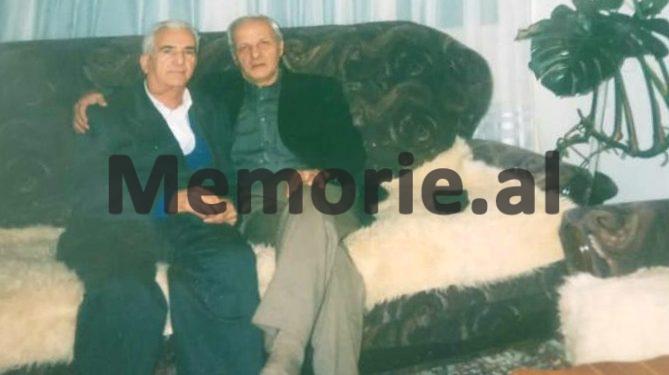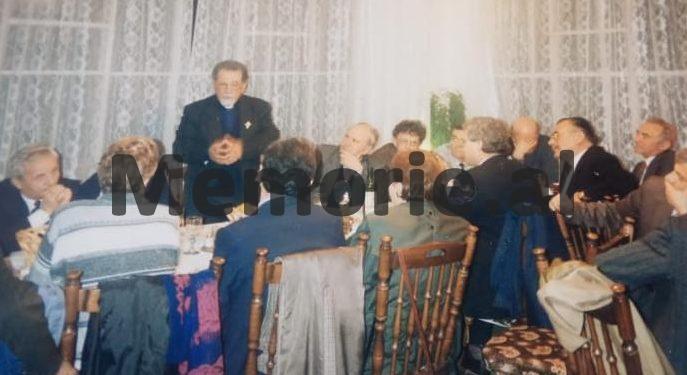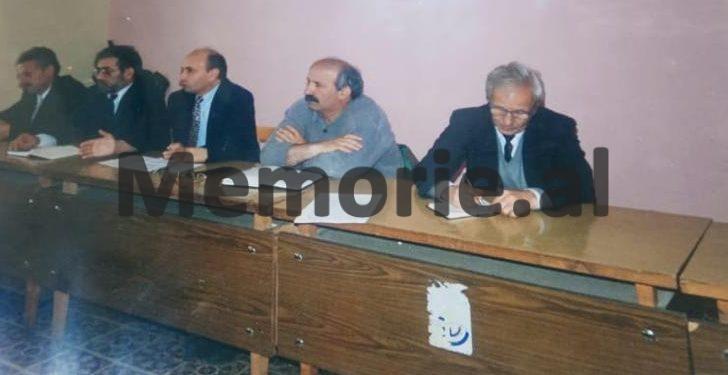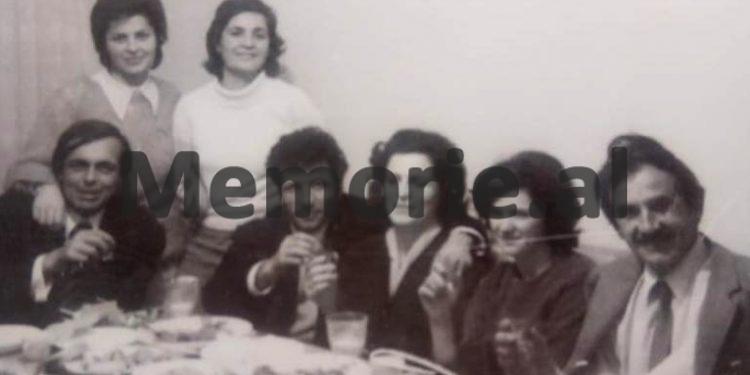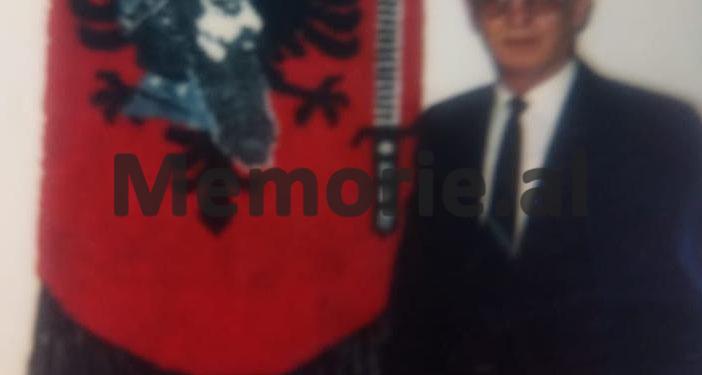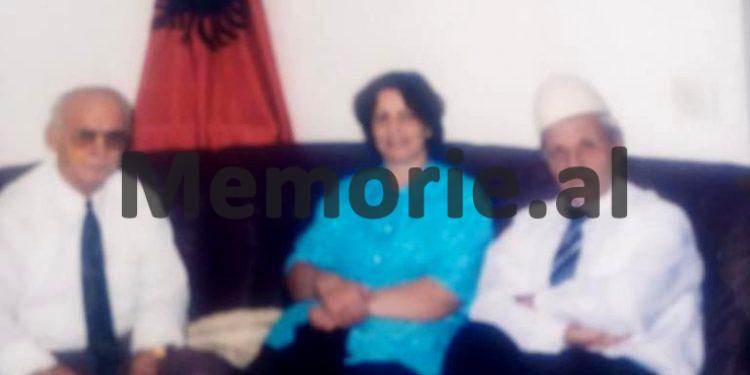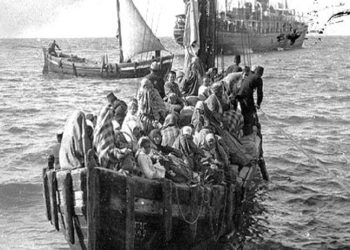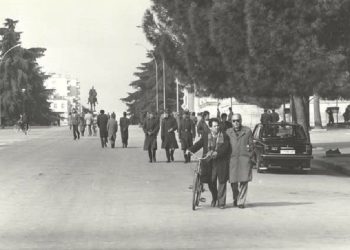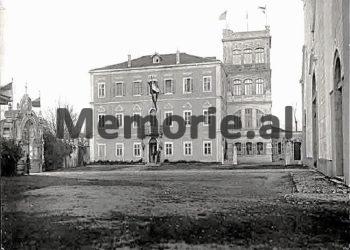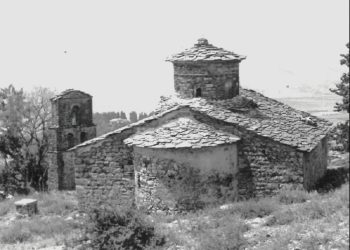Esat Myftari
Memorie.al publishes the unknown story of Esat Myftari, originally from Peja, who was in the high school benches when he was a member of a group of young boys who opposed the official Belgrade policy against the discriminatory policy against the Albanian population living in He started working as a journalist at “Rilindja” in Prishtina, from where he was proposed as a correspondent of the TANJUG Agency, but he refused and in 1963 he was forced to flee and come to Albania, with the aim of seeking help and support. from the mother country, for the clandestine organization of the “Boys of Peja”. Numerous vicissitudes in the mother country and continuous pursuit of the State Security since the time of studies in Tirana and the period when he served as an educator in the town of Shengjin and the villages of the Coast Matë, where he was arrested in 1975, after he had officially requested repatriation to his homeland Kosovo, sentencing him to ten years in prison on charges of “agitation and prop agenda ”, which he suffered in the Spaç camp. The whole painful story of the journalist, publicist, researcher, translator, MP and diplomat, Esat Myftari, is described with a literary mastery in his book, “Your death, my life” an autobiographical novel that has just come out from the Publishing House “Lena Graphic Desing” of Prishtina, and with the permission of the author, will be published in parts by Memorie.al
The unknown story of journalist, publicist and writer Esat Myftari
Esat Myftari was born on June 16, 1940, in the city of Peja in Kosovo, where his family originally came from. He completed his first elementary school education, 7-year-old and high school, in his hometown, completing them in 1959. Also, in 1959, Esat, a 19-year-old boy, began his studies at the Faculty of Law of the University of Belgrade. A lover of history and literature, he started writing at a young age when he was in the 7-year school benches and in the faculty period, he became a member of the Literary Club “Përpjekja” based in the City of To the student of “New Belgrade”, where he is affirmed quickly and from time to time, he writes poems and critical literary views, but due to their content, he does not send them for publication.
In 1961, after successfully passing the relevant competition, Esat started working as a journalist in the daily of the province of Kosovo, “Rilindja”, where he is assigned to cover the chronicle of the city of Pristina and the Kosovo Trade Unions. In the same year, he was offered a qualification scholarship at the Yugoslav TANJUG Agency, with the prospect of becoming a correspondent outside the then Yugoslavia. But his joy at the qualifying scholarship that was destined to send him abroad was quickly dashed, as the specialization offered to him was conditional on his membership in the Communist League of Serbia, which 20-year-old Esat refused. categorically.
Meanwhile, in 1963, he participated in a group of young men who disagreed and were against the policy pursued by official Belgrade towards the Kosovo Albanians and wherever they were in their lands under Yugoslavia, and on behalf of the “Peja Clandestine Group”. , as their representative, crosses the border illegally and comes to Albania. Esat’s goal as a representative of the “Illegal group of boys of Peja”, was to establish contacts with the Albanian state and to seek various support and assistance for the well-functioning of that group of young boys, which aimed to resist the discriminatory policy of official Belgrade to the Albanian population in Yugoslavia.
In 1974, some members of this group were arrested by the official authorities of the Yugoslav Ministry of Internal Affairs, accused of participating in the events of 1964, when the Albanian national flags were unfurled in the main cities of Kosovo and when they were taken strict police and judicial measures against them. The main motto of this mass movement, which was the first of its kind in post-war Kosovo, was the unification of Albanian lands with their “mother” state, Albania.
Meanwhile, Esati, who was in Albania, as well as some of his Kosovar emigrant compatriots in Albania, gained a right to study and in 1965, he began his studies at the Faculty of Natural Sciences in Tirana, in the “Bio-Chemistry” branch. After the third year of studies, disappointed by the official policy of the communist regime of Enver Hoxha and the treatment of Kosovar emigrants in Albania, who upon their arrival in their homeland, it seemed that “from the rain they had heavy hail”, interrupts his studies and requests repatriation!
Of course, this was not approved by official Tirana and in 1969, Esat started working as a teacher in the 8-year school in the town of Shengjin, in the district of Lezha, where he worked until 1974, from where he was transferred to the village of Tale. of the Mata Coast, where he also worked diligently. As during his entire period of work and residence in the district of Lezha, Esat was regularly monitored by all means by the State Security organs, even in the school where it was said that he had been sent on purpose, as they feared an escape from his opportunity to go to Yugoslavia from Shengjin, he is arrested and sentenced to 10 years in prison, accused of “agitation and propaganda against the popular power”!
After serving his full sentence while serving his sentence in the Spaç camp, etc. (not benefiting from any reduction of the sentence), Esat was released from political prison in 1985 and returned to the district of Lezha where had worked and lived before the sentence and in 1986, he started working as a worker in the Paper Factory in Lezha. That same year he started a family and then two sons were born.
In 1990, at the beginning of pluralism, Esat took an active part in the popular movements for the overthrow of the communist dictatorship in Albania and with the establishment of the branch of the Democratic Party for the district of Lezha, at the beginning of 1991, for his past and contribution. great at the beginning of those popular protests, he is elected secretary of that branch.
Also, as a result of that contribution, in the first pluralist elections of March 22, 1991, Esat was elected a member of the Democratic Party in the People’s Assembly, representing the voters of the Mata Coast, where he had worked as a teacher until the day of his arrest in 1975.
A year later, in the autumn of 1992, he was appointed Director of the Diaspora Directorate at the Ministry of Foreign Affairs of Albania, headed by the Minister, Alfred Serreqi. In that position, Esat worked diligently until 2000, when he was appointed diplomat at the Albanian Embassy in Riyadh, where he remained until his retirement.
Since that time, Esat has been devoted to his passion, writing, studies and translations and since 2011, he has started publishing several books, which have been welcomed by critics and readers, also because of their subject matter, as well as the variant of Gegërisht that he wrote them, which is very rare in Albanian publications of the mother country!
The first book published by Esat Myftari is “Emrush Myftari” (monograph), and after him come: “Kosovo and Enver Hoxha” (study), “Political profile of Esat Mekuli” (monograph), and “Your death, life ime ”, which is an autobiographical novel, where he has skillfully and chronologically described most of his life, from family and life in Kosovo as a high school student, escape to Albania, many vicissitudes from surveillance of State Security prosecution, arrest, investigation, trial and deportation to Spaç prison.
All the events and everything described in the book “Your death, my life”, are real and the characters there are presented with their concrete names and surnames, while only those people who badly affected his life, (mainly, those of bodies of the Ministry of Internal Affairs of that time, such as operatives, investigators, police officers, heads of the Ministry of Internal Affairs and the Branch of Internal Affairs of Tropoja, Lezha, witnesses in his trial, etc.), the author was has only changed the names, giving them their real surnames.
Continued from the previous issue
Excerpts from the book “Your death, my life”, author, Esat Myftari
He found the hall with narrow, old seats, groaning at every touch of theirs, filled with co-operatives and teachers who would give content to this show. With that quick, unfocused look – in his mind these must have been the crowds – he spotted only two or three familiar faces of colleagues with whom he played ping-pong almost every day in the school annex. The others were covered with a cloud of confusion and the smoke of a stranger.
Ridvani was deliberately released with us his weight on the ulsen. He wanted to make it clear to others that he had come with a living will and that what reflected his third and yellow face was only a temporary and deceptive condition.
At the table opposite were sitting the two investigators and the chairman of the cooperative, his former student of the “night school”, who would lead this process with the strange name, not to say illegitimate, because this word had long been lost in this place every sense. It was said that popular investigators were conducted on two occasions: when there was insufficient evidence for a regular trial, or when they were accused of gossip or fantasy, he had gained prestige and was brought there to be profaned with trifles of worthless examples.
Investigator’s word: We brought here the former teacher and your colleague, the Yugoslav emigrant, Ridvan Myftari, for his hostile activity…!
The chief investigator took the lead and said:
– We brought here the former teacher and your colleague, the Yugoslav emigrant, Ridvan Myftari, for his hostile and treacherous activity, to the detriment of the Party of our country. Therefore, we invite you to tell us honestly and with facts everything you know about his illegal views and actions.
His speech was not only short, but also without any nerve. He had used this stamp so often during his professional life that he was probably almost disgusted with it. But others who were hearing these common expressions – in stark contrast to what the area operative had spread among the people – were confused and disappointed.
The reluctance of those present lasted longer than expected, although the testimonies were pre-prepared and the witnesses had no choice but to enter the role.
– Well, …, said the chief investigator, – say what you have to say.
– Then, I’m breaking the ice!
Ridvan realized that teacher Drane had taken the floor behind his back.
– I know Ridvan well, she started, because we worked together in Shengjin. He has always been ambitious, wanted at all costs to win at ping-pong; in order to have short and sluggish blows, to annoy and tire the opponent; he even became a school champion with such tricks; even in chess, likewise, he loved victory with perseverance, only in football it was a little different, as everyone said! I have something else, which means a lot to me: how can it be explained that until April of the ’70s he wore dock pants torn and when he sat in the winter in the teachers’ room he covered his knees with the edges of the overcoat so that they would not look like the landscape . But, when he came to visit her, he returned to Shengjin, dressed as a creco, in a sewn suit in Belgrade’s “Beko”, with no less than 16 shirts, which he began to distribute as gifts to friends. Wasn’t this an open figurative propaganda, to show the abyss that separates Yugoslavia from Albania?
The chief investigator, who was well acquainted with the case of Ridvan’s mother – among the materials received from the Center in Tirana was the report of the informant hospitalized in her room for this purpose – welcomed her reasoning and made unexpected remarks about her. attendees: friend Drane, the mother who would surely make her son happy with something and secondly, who does not want the victory in the game, it is therefore played with a competitive spirit. Do you have anything else to add?
“Ah, yes,” she continued, “I almost forgot.” One night I was listening to a lively monologue in the room next to the times and I said to look who had come, since his door often opened and closed at night, I do not know from whom. I went out and found out. He kept talking in pieces, but I was only catching his voice. I became very curious. I thought: who will be the person who refused to answer? I knocked on the door and, when it opened, I saw only one cat lying on his bed staring like an idiot around. To tell you the truth, I felt sorry for him and, to cover my emotion, I asked him for a book in vain. He found it in his library and, when he handed it to me, he said to me with an ironic grin: I believe you will browse it.
– Are these defendants true? – asked the chief investigator at the end.
Ridvan thought for a moment, remembering that she had climbed a cliff overlooking the sea and that she had accidentally found refuge in a second-hand high school, where she had mastered some five or six rules of a already dysfunctional language. place. Such was her fund that she had barely pushed her into her tight sack, but that her superiors had called her enough to appoint her as an educator and teacher in this remote and remote village.
– Release it down! – said Ridvani and why she laughed out loud: in fact there was a deep regret for those wonderful, squet kids who turned her Russian class into a playground and would like to have it more often a week than that math teacher who ran with them with an unrewarding zeal.
The chief investigator was barely holding himself back because he realized he should not have chosen a witness like her.
– Good Drane, good, thank you! – he said and, to finally shut his mouth, he hurriedly asked: Who else loves the word? Yes, fellow director!
Director Zefi: Ridvani put on the honorary plaque a student from the kulak family…!
Zefi’s director Zani, an unassembled bass with no emotion dilution and almost forgotten, came to the whispering and piercing ear of the acquaintance, probably because he was very close, a row behind him.
– In the red corner of the classroom where teacher Ridvani was the caretaker, he spoke, he had placed pictures of students from affected families of kulaks. Those students were indeed distinguished in lessons and behavior, but he knew they were not allowed to be advertised. Eventually, they would end up an eight-year-old and end up as cooperatives. So who did what he was doing serve? Of course, to show that our system suffocates talents from the egg, that nature itself is raped here ?! So I got angry with him and we had to intervene because he refused to remove those pictures with his hand. He even offended me when he said that “I do not interfere in the fate of these innocent angels, may you be the one who treats them right now with these kinds of complexes”. Not me, I replied, but the Party teaches us to be consistent and vigilant! It was only when I reminded him of the party that he closed his mouth that he knew what other bolls he would get out of his mouth.
– True, defendant? asked the chief investigator.
“True,” said Ridvani, “except for the bully he wants to get from his plot to mine!”
– Another fellow director? asked the chief investigator.
– No, because after this incident I was transferred and I had no more contact with him, but I believe that others will complete the framework.
– Thank you, fellow director.
Doctor Frroku: Ridvani said that even animals have a conscience…!
It seems his words warmed the atmosphere. Immediately after him took the floor Doctor Frroku, a dark-haired, dark-haired man who differed so much in appearance from these highlanders. Ridvan was pleased to discuss this as well, as they were in conflict worldwide in the ideological education class. He remembered the hour when the doctor was ashamed of him in an exemplary way, so he called him to be knocked out forever. The scene that came before his eyes, even with brighter tones, took place like this: on the eve of his arrest, the school reported – it was said that this was done by the doctor – that Ridvan Myftari claimed that the animals also have a conscience. The report had started in the Lezha party committee and had raised concerns. But since they doubted its veracity, for the next meeting they sent for expertise Dr. Frroku together with the chief of finance who was held as the ideologue of that area. Ridvani, aware that there would be a clash, devised a small grotesque trap: he studied the pamphlet with excerpts from Engels’ “German Ideology” carefully, extracted from it some notes with slightly more complex wording for first reading and listening, and he slipped the booklet into the inside pocket of his jacket. In his discussion he reproduced the contents of some of these notes and in closing said: this is what is said in “German Ideology”.
That’s what Dr. Frroku wanted to do when he jumped from the table like a gut:
– You see, colleagues, I have been telling you to be careful for a long time – they said that since he was elected secretary of the party organization for medical students, there, in Tirana, he spoke only in hyper-Tosk and made titanic efforts to do not escape any word or locus geg after it would then be discovered that it was a piece of katunari – I told you that this one feeds on bourgeois literature and comes here and sells us as a scholar, when he is but an ungraduated loser. But we will not allow this birbo to graze as it pleases. As Comrade Enver said, “we will not allow pork and sows to enter and leave our beloved Albania”.
When Ridvani saw that the teachers’ body had been silenced by the doctor’s attacks and that in the present situation they would be asked to express their thoughts, Ridvani decided to intervene and free his colleagues from his harassment:
– I am sorry for this attitude of Dr. Frroku. What I said is really taken from the German ideology that in his mind is sounding like heresy, but please forgive me for a moment! Ridvani put his hand in his jacket pocket, took out the pamphlet and addressed the audience: do you see the author of this pamphlet? This is Frederik Engels, Marx’s close friend, a classic of Marxism-Leninism, which we hold high in every manifestation and was printed in our publishing house “Naim Frashëri”, Tirana. So what’s my fault?
But now, as he watched Ridvan, according to him, finally collapse into the ditch, he did not show any of those unbridled arrogance, even, in an almost cantilever voice, he said:
– I’m sorry that this Kosovo man ended up like this. Of course he has made serious mistakes – this is clear to all of us – not leaving our generous party another chance to curb him. But I hope that, where it will go, I will reflect and after re-education it will come back to us rehabilitated.
That said, he sat down.
Chief Investigator Ridvani uttered no words but laughed implicitly at the same time, as if a common spring had been violated. Indeed, each of them had in mind their own sights of this provincial hypocrisy. Investigators recalled how the doctor rubbed his hands with pleasure when he called him to the office to formalize his report, while Ridvan still heard his threats against the desolate teachers to leave him, like a virus. of foreign culture and interests for them and the country.
The only “witness” who was received with great curiosity by Ridvan was the poet Ibrahimi, in the process of being formed as such, and whom he regarded as a literary interlocutor, although they had ten years in between. He had already published the first collection of poems, the critics had exalted him like a lily of a dry land, and even recently he had been promised that he could replace the editor of the cultural page of the newspaper “Zeri i Popullit”, after the former editor, yes so the poet, being close to the liberal intellectuals, had opened to them the disproportionate space in the party organ. The poet Ibrahimi, with the desire to make fun of others who were stumbled upon by less reprehensible examples, was caught for two moments somewhat more prominent and in accordance with the legend that was being woven around him. He lectured in more chosen words than the others:
Poet Ibrahimi: Ridvani reads to until late hours and the book he liked the most was…!
“In the defendant’s room (he was reluctant to address his mother) the lights were on until late at night. I noticed this well and often, since my house is in front of the school. We all knew that in that room he often had fun and danced, almost every evening. The defendant once told me that in that way they were killing the lemonade of life in the village and away from the families, although the people kept whispering that other things were being played there …?! And the book he liked the most, from which he had translated some short excerpts for me, had an intriguing title: “On Love”. It had assured me that the content was amazing and that it dealt with the evolution and forms of love over time, that is, the transformations that followed it in line with the development of human society. I was struck by a line from those of a time when Persian painters were taking the bold reform step to soften the strict rules of Sunni doctrine. The vignette depicted a woman sitting on a man’s lap, which exemplified me with a pornographic scene, typical oriental. I made the occasional remark, but he turned to me briefly: You are fantasizing in vain, O Ibrahim! After that, he spoke to me about the pagan priests of ancient Egypt who practiced the custom of jus prima noctis. Come on, happy, happy, there were murmurs of the defendant. And he informed me that circumcision, as a model of purity and health, was used by them, long before the Jews and Muslims. I also remember his mockery of Soviet society. He told me that in that first almost unreasonable surge of the victorious revolution, which decided to apply Engels’ principle which says that when a couple’s love in marriage ends, then it is no longer moral for them to continue living together. . This principle was discussed in the Russian Duma and turned into law. As a result, divorce proceedings were simplified to the brim: a postcard was notified to notify the head of the neighborhood or village, and everything was done automatically. But it soon became apparent that the consequences were catastrophic, and the law was hastily repealed, as it was passed. Engels was blamed for not knowing about married life. The conclusion, the defendant told me, is quite simple … some laws of nature must be respected, therefore even atheism can not be decreed! That’s all I had, Mr. Investigator. ”
– Thank you, Comrade Ibrahim, for giving us very valuable evidence. Yes defendant, speak! – he said, when he noticed that Ridvani had raised his hand instinctively to answer
Ridvani, obviously touching them, spoke as if for himself:
– Ibrahim, poetry will be sincere … I treated you like a little brother. Shame and misery for what you said!
The effect of Ridvan’s words was great, who was not piping. The silence would last too, but from the end of the hall the question was heard in a resounding and heartfelt voice.
The internee Can Canolli, the only man who defended Ridvan…!
– I am Can Agolli, of the new colony. May I say a few words too?
All present turned their faces towards him.
– Definitely – found the chief investigator, we are almost happy for his involvement in this investigator.
– I knew Ridvani superficially during these few months that I am here. As it is known, the state bodies, by special order, have brought us for re-education. But the people we found here are being very reluctant to us, so we barely talk to them. I remember there are a lot of prejudices about us. The only person who has welcomed us with a white and open heart, who has given us acquaintances and friends, who has offered us dignity and books, is teacher Ridvani. I came here to express my gratitude for my part and that of my friends. The rest belong to you honorable investigators and his former colleagues with whom he has lived and worked.
This moral breeze seemed to expel the polluted air of that narrow and perverse space. Ridvani greeted his courage with his mind and it was good that he heard this gratitude with his own ears. In addition, his joy was great even though this gratitude was coming from a community for which he had really shown empathy from the first days, but everything developed naturally. And yet, there was something deeper on both sides: Can Agolli was part of the “colony” of delinquents in the capital, who on a beautiful spring day were unloaded by truck and trussed near the sea, in an environment surrounded by pine trees .
It was a kind of extraterritoriality of young people, unintelligible and suspicious, but, as far as he had heard, generally from regular civic families. It was officially announced that they were the remnants of society that broke the morals and order in the capital, young people who at their age knew nothing but gambling, who as cunning brothers had disturbed the comfort of passengers on buses, dealing with pigeons like deer that were; that the state had intended to build for them a kind of Makarenko institute, initially without educators, but with the promise that one day the milestones of institutes would be implanted there, which, in time, would receive new hospitalizations and functions. The villagers took these official settings for granted so they were staying away from them. The only thing that contradicted these assessments was their appearance: boys who were chosen for their beauty and dexterity, with seder and arrogance, who were slowly radiating citizenship and exquisite humor, who were gaining the sympathy of the work-related cooperativists. of land, with unpaid yields and coping with the consequences of a class mortgage.
And for his taste, these guys were the most unexpected and liked variant in the environment that was becoming more and more stagnant. Often, to his room, came the meek echo of the ancient civic songs with which he grew up in Peja. And, when he dug a little in their pedigree, it turned out that a good part of them were the sons of Kosovar and Dibra refugees fleeing Serbian atrocities at different times, or the daughters of the politically persecuted of all Albanian lands, but who still do not had arrived to merge with the native body; with these songs full of nostalgia they filled Ridvan’s loneliness and encouraged him to plunge sadly into the magma of a nation still in its infancy. These civic songs, with a half-forgotten vocabulary and melodic line, had suffered their own fate, so, apparently, they sang them at night as a political feud.
The popular investigator, who had remembered him as a Golgotha among the people breathing in his ears, found it almost like a fun and meaningful pastime.
When he was returned to the dungeon, he felt great relief because he was convinced that his figure, however, had remained untouched and that the evidence presented was a disgrace and a failure for the two investigators, Gjoleka and Grigor Selenica.
Barber
a) The day of arrest
One of the locals whom Ridvani liked in civilian life was the barber Nasufi. He was a guild seed still alive in spirit, small in stature and with a thin mustache, always meticulous and talkative. From the first visit Ridvani had liked his body and shop cleanliness. He was generally a quiet guy, especially when he was out, on the street or in the company of friends. But, inside his hairdresser, he removed without feeling the mask of his silence and was able to start assemblies from the most diverse and with a very sweet language. In addition, there was a strange tendency: he associated thoughts about people and events with names, details and, if you asked, even addresses, so much so that it seemed to be a small walking encyclopedia of that area. Thus, from him, more than others, he had learned the history of the port with the big and ancient name, but, for some time now, with small and accidental developments.
Barber Nasufi, with his second job in the cells of the arrested…!
Barber Nasufi was an anas, with the characteristic laziness of man that was removed as we avoided the flood of the future. Once upon a time, Shkodra dominated that space, but in a mild way: with language, with music, with education, with local government administration and with bank employees. And after the war, as he said, with the influx of southerners, as credible of the regime and with the construction of the military base, the radius extended and touched all the social and administrative ramifications of them. The heroic role of this kind of anasi was to serve correctly, regardless of profession or preparation, and to have a well-assembled smile, albeit insincere, but not necessarily cold. The topics that the barber Nasufi was dealing with, were increasingly exceeding his intellectual abilities and from time to time were appearing with somewhat dangerous formulations: there were data and opinions in them that Ridvani had heard and climbed, but mainly among his trusted and tried friends.
In such cases Ridvani had chosen the middle way: neither affirming nor denying but only listening or moving his head affirmatively or negatively, because he knew that these meanings could not be clarified for anyone. It was indeed the familiar habit of barbers to show human events and intimacy with the innocent desire to turn the occasional visitor into a permanent client. The same thing happened to him in Peja: when he went for the first time he had a razor on his face – he was a graduate at that time – the barber had kept him with assembly and jokes about his manhood and the need to celebrate this moment with a girl beautiful and novice.
Outside of this environment, as it is known, the barber is everywhere an ordinary, silent citizen, who crosses the streets like a shadow, who leaves no trace and who does not seem to care about anyone. Therefore, the next day of his arrest, Ridvani was stunned when in the space of the toilet without a barber he was waiting for Nasuf to sit in a chair, with his white blouse and his careful combing of his hair, but without the scent of lavender. Bulgarian for which he had been praised before. Or Ridvan’s noses were fairy and no longer smelled any perfume. He was shocked because he did not know that he was doing this kind of second job (he had not done it either the slightest allusion to it), in such spaces suffocate ammonia. They have only been eye to eye for a while without any intersection or spark of hatred.
Day one: The shearing machine started with ladrue across Ridvan’s regular row. From there, as if from a sky filled with black clouds, the locks of his hair were falling. The light waves of that hair rested for a few minutes on the white cover until they fell to the ground and a stream of water took them away and sank them beyond the yellow lips of the siphon to accompany them with the flow of other black water. . Ridvani that day felt a sigh of relief in his chest because he knew that for at least a decade they would not be allowed to grow, so for an indefinite time his head would look like burnt earth, but, even when these hairs gained freedom as well as his body and limbs, they would look different, without any temptation, which meant that that day he was forever parted with an aspect of his youth.
After the hair, it was the turn of the beard. He had not had a razor blade on his face for several days. Barber Nasufi really squeezed the fork in the soap bowl like other times, but now just to moisten its strands and to whiten the thick and coarse hairs of his former client. Shortly afterwards, Usta Nasufi carelessly dropped his hand over his face, even though the blunt blade of the razor was stumbling through them.
Ridvani gathered all his strength not to shed tears, but in vain. In a moment of weakness, the bag of tears probably cracked thin skin and a few drops fell and swelled on the white sheet covering his lap. He did not love himself, though everything was involuntary. In this way the Wednesday which was appointed for the guard, was baptized by Ridvan as the day of his rapture. The blemishes that remained on his face after each shave were living proof of this razor, but they had no one to testify to them except the prison guard and the investigators to indulge in the zeal of Usta Nasuf. Memorie.al
Continues tomorrow




